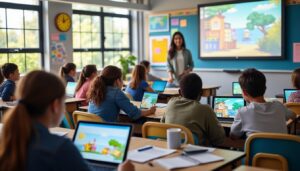In an increasingly connected world, student journalism is emerging as a key tool for training the next generation of reporters. News Decoder, aware of the challenges facing today’s young journalists, has developed an innovative digital tool designed to enhance their training and practice. This tool, called Mobile Stories, offers a structured framework to facilitate the learning of journalism, while integrating practical and interactive elements tailored to the contemporary needs of students.
Understanding the Context of Student Journalism in the Digital Age
The current journalism landscape is constantly evolving, particularly with regard to the way students engage and learn. With the rapid development of digital technologies, the need to provide relevant and tailored education has become paramount. Today’s students have access to a plethora of information, but often lack the tools to assess its quality and reliability.
Yet, the role of journalism in society is fundamental. The education of young journalists must therefore focus on their ability to produce quality content while developing critical and analytical skills.
Current Challenges in Journalism Training
Journalism students face several challenges that hinder their learning and their ability to enter the professional world:
- Information Overflow: Young people often struggle to sort through relevant information in an ocean of data.
- Lack of Practical Training: Many do not receive adequate on-the-job training, which limits their real-world experience.
- Pressure for Speed: Students are faced with the need to publish quickly, which can compromise the quality of their work.
In the face of these challenges, initiatives like those offered by News Decoder are crucial. The Mobile Stories tool was designed to address these issues by providing a structured framework for journalism education.
The Importance of Media Literacy
Media literacy has become essential for students. It is not limited to understanding media, but also extends to knowing how to create and critique it. The new News Decoder tool promotes this literacy by integrating the following elements:
- Source Identification: Learning to distinguish reliable from less reliable sources.
- Critical Evaluation: Developing the ability to analyze information based on its relevance.
- Content Creation: Producing articles, reports, and multimedia content adapted to different formats.
Adequately trained young journalists can become not only consumers of information, but also critical creators who actively participate in the public conversation. Introducing Mobile Stories: An Essential Tool for Students
Mobile Stories is an innovative platform developed by News Decoder to support students throughout their journalism learning journey. As a digital tool, it provides simple and direct access to a wide range of educational resources. This approach not only promotes self-learning but also enables students to create authentic and engaging stories.
With an intuitive design similar to a blogging platform, Mobile Stories offers an interactive learning experience through a series of steps:
Topic Proposal:
- Students can submit their story ideas. Step-by-Step Guidance:
- Writing guides and video tutorials are available at each stage. Easy Publishing:
- Students can easily publish their articles on the platform. This process fosters student engagement while providing meaningful educational support.
Key Features of Mobile Stories
Mobile Stories stands out for its practical features that enrich the student learning experience:
Feature
| Description | Professional Video Tutorials |
|---|---|
| Access to educational videos created by experienced journalists. | Open Learning Resources |
| Access to relevant documents, articles, and examples to deepen understanding. | Collaborative Platform |
| Ability to work in groups on reporting projects. | Monitoring and Assessment |
| Integrated tools allow educators to track student progress. | These elements, combined, make Mobile Stories a powerful tool that not only focuses on theory but also on practice, bridging the gap between education and professional reality. |
Impact of Mobile Stories on Student Performance
Since its launch, Mobile Stories has demonstrated real potential to transform journalism learning. By offering a dynamic and interactive writing environment, students develop skills that will be valuable in their careers. The quality of the articles produced has also seen a significant improvement, with varied topics ranging from literary criticism to investigations into contemporary issues.
In 2025, platform usage analyses show that:
136 articles published
- in total on the mobile platform. 700 projects in progress
- covering a variety of topics.High student satisfaction
- thanks to practical support and accessible resources. Student feedback reveals that the opportunity to create news stories not only boosted their confidence, but also their understanding of contemporary media issues. This is due to the combination of theoretical learning and practical experience.
Case Studies: How Mobile Stories Helped Students
To illustrate the impact of Mobile Stories, several case studies can be presented:
A student in Romania
- used the tool to write an article on a mental health awareness initiative, which was published locally. A group of students in Finland
- produced a comprehensive report on the impact of fast fashion on children, which attracted media attention and sparked debate. These examples illustrate the engagement of students in meaningful projects that go beyond the academic sphere.
Towards a Bright Future for Student Journalism
There is no denying that with tools like Mobile Stories, the future of student journalism is full of optimism. By combining theoretical education with practical learning methods, News Decoder helps train journalists capable of tackling the challenges of the digital age. Collaborating with organizations like Voice4You to expand access to this tool across Europe reinforces this vision.
In 2025, trends indicate continued growth in distance learning and integrated digital tools. The encouraging results from the implementation of Mobile Stories suggest a wider adoption of this pedagogical approach in other educational disciplines.
Reflections on the role of digital tools in education
Digital tools have the potential to transform education by enabling more interactive and inclusive learning. Equipping students with useful, practical skills is essential to their success. Tools like Mobile Stories illustrate how technology can strengthen student engagement with journalistic themes.
By consolidating all learning around journalism, it is possible to promote a culture of communication, investigation, and critical analysis. Meeting these expectations is essential to prepare students for the future, as they face an increasingly complex media world.




